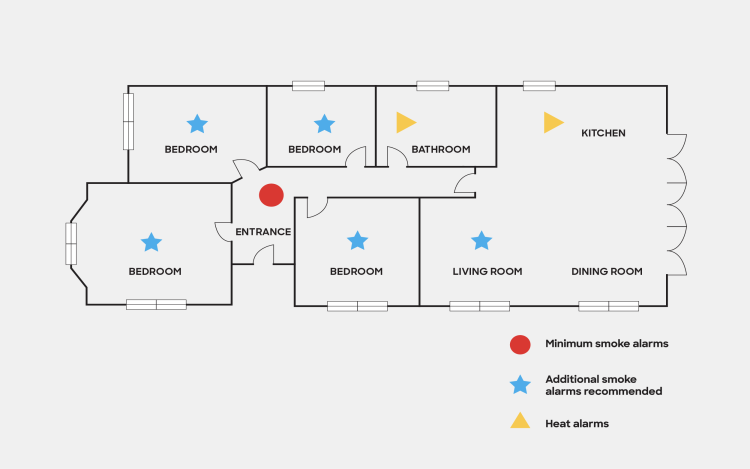
Smoke alarms didn't save Bella's teddy.
They saved her life.

Press their buttons to make sure they’re ready to protect you
-
3:00
Smoke from a house fire can kill in less than three minutes.
-
40%
of residential fires we attended last year did not have smoke alarms installed.
-
4x
You're four times more likely to survive a house fire if you have a working smoke alarm.
Which type of smoke alarm should you buy?
Fire and Emergency New Zealand recommend long-life photoelectric smoke alarms. They are far more effective than ionisation alarms at detecting slow smouldering fires, which burn for hours before bursting into flames.
Better yet, choose a set of photoelectric smoke alarms that can be connected to each other wirelessly, via a dedicated radio frequency, or wiring together. If a fire is detected in one room of the house, interconnected alarms will trigger all the alarms in your home, so everyone will be alerted to a fire sooner. This is especially important in multi-storey homes and homes with long hallways
![]()
Make sure you have long-life batteries
The great thing is, most smoke alarms now come with a built-in, sealed, long-life battery, which will last as long as the smoke alarm – about ten years.
That’s a big improvement on the old 9-volt batteries, which are cheaper but will start ‘chirping’ to be replaced after about one year. If you have a smoke alarm with an old 9-volt battery, it’s time to upgrade to a long-life photoelectric alarm.
Hard-wired smoke alarms
Some smoke alarms can be wired into your home’s power or security system. But you will still need a back-up battery installed in case of a power cut, and installation will be more involved (and costly) as you will need an electrician to run wiring to each location.
Smoke alarms for Deaf or hard of hearing
If you’re Deaf or hard of hearing, there are specialised smoke alarm systems with extra features such as extra loud and/or lower pitch alarm sounds, flashing strobe lights, or vibrating devices.
Having hard-wired, interconnected photoelectric smoke alarms fitted alongside bed-shakers and/or strobe lights is ideal.
Who is responsible for smoke alarms?
Both landlords and tenants are responsible. The landlord is responsible to ensure there are working smoke alarms in every rental, and to replace any smoke alarms that no longer work with new photoelectric ones.
It is the tenant's responsibility to maintain smoke alarms, this includes cleaning them every 6 months and replacing the battery for alarms with 9 Volt batteries.
Where should I put smoke alarms?
Fire and Emergency New Zealand recommend installing a smoke alarm in every bedroom, hallway and living area. You may also choose to install a heat alarm in the kitchen, laundry, bathroom or garage.
- Don't put a smoke alarm in your kitchen, where smoke from cooking could set it off – use a heat alarm here instead.
- Smoke alarms cannot detect smoke through a closed door, so think carefully about the layout of your home.

Property requirements
Your landlord must install a smoke alarm:
- within 3 metres of each bedroom door, or in every room where a person sleeps
- in each level or story of a multi-story or multi-level home
- in all rental homes, boarding houses, rental caravans, and self-contained sleep-outs.
Building code requirements
If you're building or renovating and have been issued a building consent, the New Zealand Building Code requires interconnected smoke alarms in every bedroom, hallway and living area.
Smoke alarm maintenance guide
How to maintain and check your smoke alarms regularly.
Once a month
Press the test button to sound the alarm. (Use a broom handle if you can't reach the button).
Every six months
Vacuum or dust your smoke alarms to help avoid false alarms.
Every year
Check the expiry date, usually located on the bottom or side of the alarm. If there's no expiry date, it's best to replace the alarm.
If you have a 9V battery alarm, replace the battery every year. Your alarms will start to beep regularly if the battery is low.
Every 10 years
Replace all smoke alarms with new long-life photoelectric smoke alarms.
For hard-wired smoke alarms
Follow the testing and maintenance schedule provided by the installer.

